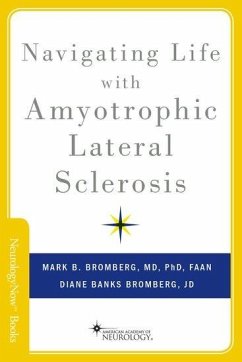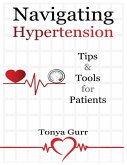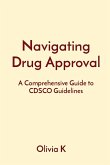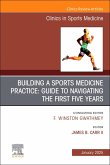- Broschiertes Buch
- Merkliste
- Auf die Merkliste
- Bewerten Bewerten
- Teilen
- Produkt teilen
- Produkterinnerung
- Produkterinnerung
Navigating Life with Amyotrophic Lateral Sclerosis provides accessible, comprehensive, and up-to-date information about the challenges patients, family members, and caregivers face when confronted by ALS, a disease that affects approximately 5,600 Americans every year, with as many as 30,000 people managing the disease at any given time. ALS is a difficult disease for the patient and is also challenging for the caregiver and family as there are many questions, issues relating to care, and problems to manage. This guide covers all aspects of managing ALS, from the onset of symptoms, diagnosis,…mehr
Andere Kunden interessierten sich auch für
![Navigating the NICU Navigating the NICU]() Abel IsaacNavigating the NICU38,99 €
Abel IsaacNavigating the NICU38,99 €![Navigating Hypertension Navigating Hypertension]() Tonya GurrNavigating Hypertension12,99 €
Tonya GurrNavigating Hypertension12,99 €![Navigating Drug Approval Navigating Drug Approval]() Olivia KNavigating Drug Approval29,99 €
Olivia KNavigating Drug Approval29,99 €![Navigating the Complexities of Stroke Navigating the Complexities of Stroke]() Louis R. CaplanNavigating the Complexities of Stroke24,99 €
Louis R. CaplanNavigating the Complexities of Stroke24,99 €![Building a Sports Medicine Practice: Guide to Navigating the First Five Years, an Issue of Clinics in Sports Medicine Building a Sports Medicine Practice: Guide to Navigating the First Five Years, an Issue of Clinics in Sports Medicine]() Building a Sports Medicine Practice: Guide to Navigating the First Five Years, an Issue of Clinics in Sports Medicine99,99 €
Building a Sports Medicine Practice: Guide to Navigating the First Five Years, an Issue of Clinics in Sports Medicine99,99 €![Navigating Miscarriage Navigating Miscarriage]() Navigating Miscarriage39,99 €
Navigating Miscarriage39,99 €![Navigating Organized Urology Navigating Organized Urology]() Navigating Organized Urology40,99 €
Navigating Organized Urology40,99 €-
Navigating Life with Amyotrophic Lateral Sclerosis provides accessible, comprehensive, and up-to-date information about the challenges patients, family members, and caregivers face when confronted by ALS, a disease that affects approximately 5,600 Americans every year, with as many as 30,000 people managing the disease at any given time. ALS is a difficult disease for the patient and is also challenging for the caregiver and family as there are many questions, issues relating to care, and problems to manage. This guide covers all aspects of managing ALS, from the onset of symptoms, diagnosis, treatments, and coping strategies, to the use of home health care or hospice, and new research in the field. The book also sheds lights on difficult topics, such as end-of-life care and managing legal affairs. Navigating Life with Amyotrophic Lateral Sclerosis is unique because it covers two perspectives: one author is a neurologist with 30 years of experience treating ALS patients, and the other author experienced first-hand the issues in providing care for a parent with ALS. Formatted in a question-and-answer style, peppered throughout with patient stories, and with sections devoted to family members and caregivers, this compassionate resource provides guidance to those seeking to understand how to live with this disease.
Produktdetails
- Produktdetails
- Verlag: OUP US
- Seitenzahl: 280
- Erscheinungstermin: 1. Mai 2017
- Englisch
- Abmessung: 210mm x 140mm x 15mm
- Gewicht: 346g
- ISBN-13: 9780190241629
- ISBN-10: 0190241624
- Artikelnr.: 47863839
- Herstellerkennzeichnung
- Libri GmbH
- Europaallee 1
- 36244 Bad Hersfeld
- gpsr@libri.de
- Verlag: OUP US
- Seitenzahl: 280
- Erscheinungstermin: 1. Mai 2017
- Englisch
- Abmessung: 210mm x 140mm x 15mm
- Gewicht: 346g
- ISBN-13: 9780190241629
- ISBN-10: 0190241624
- Artikelnr.: 47863839
- Herstellerkennzeichnung
- Libri GmbH
- Europaallee 1
- 36244 Bad Hersfeld
- gpsr@libri.de
Mark B. Bromberg, MD, PhD, FAAN, received his PhD in neurophysiology from the University of Vermont and his MD from the University of Michigan, where he also received his training in neurology. He is currently a professor of neurology at the University of Utah. He has been involved in ALS research and patient care for more than 30 years. Diane Banks Bromberg, JD, earned her law degree from the University of Utah and practices commercial real estate law. She cared for her mother, who had ALS.
About the ANN's Neurology NowTM Books Series
Lisa M. Shulman, MD
Dedication
Preface
Acknowledgements
Chapter 1- Introduction
What are the Basic Features of ALS?
How it Starts - Patient Stories
How to Use this Book
Chapter 2 -ALS Origins
Why the Name ALS?
Is ALS Different from Motor Neuron Disease?
Is ALS a New or Old Disease?
How Common Is ALS?
Who Was Lou Gehrig?
Who Else had ALS?
Chapter 3 - The Diagnosis of ALS Diagnosis
What Features Make the Diagnosis?
What Does the Neurologist Look For?
What Are the Symptoms and Signs of ALS?
Bulbar Difficulties
Upper Extremity Difficulties
Lower Extremity Difficulties
Why So Many Tests?
What Are the El Escorial Criteria?
What Are "Rule Out" Tests?
Why Does it Take So Much Time to Make the Diagnosis?
Do I Really Have ALS; What Diseases Mimic ALS?
Multifocal Motor Neuropathy with Conduction Block (MMN)
Inclusion Body Myositis (IBM)
Kennedy Disease
Cervical Spondylitic Myelopathy
Lumbosacral Spondylitic Radiculopathy
Lyme Disease
Carpal Tunnel Syndrome
Ulnar Neuropathy at the Elbow
Should I Get a Second Opinion?
How Was the Diagnosis Given and Received?
Chapter 4 - Causes of ALS
What Causes ALS?
Why Do Neurons Die in ALS?
Glutamate Excitotoxicity
Oxidative Stress
Mitochondrial Dysfunction
Protein Aggregation
Immune Dysfunction
Gene Mutations
Challenging Facts About ALS
Why Do I Have ALS?
Environmental factors
Clusters
Military Service
What Is Familial ALS?
How Is ALS Passed On?
Autosomal Dominant Inheritance
Autosomal recessive Inheritance
X-linked Inheritance
How Many Genes are Associated with Familial ALS?
Are There Genes Associated with Frontotemporal Dementia?
Are Genetic Causes of ALS and Frontotemporal Lobe Dementia Related?
How Do I Know if I Have Familial ALS?
Should I Have Genetic Testing for ALS?
Should Family Members of Individuals with Familial ALS Have Genetic Testing?
Chapter 5 - Motor Progression of ALS
How Does ALS Progress?
How Is Progression Measured?
Muscle Strength
Functional Rating Scale
How Fast Am I Progressing?
Does ALS Ever Get Better?
Are There Staging Scales for ALS?
Chapter 6 -Non-Motor Features of ALS
What Is Frontotemporal Lobe Dementia?
What Are the Features of Frontotemporal Lobe Dementia?
How Is Frontotemporal Lobe Dementia Diagnosed?
Why Is It Important to Diagnose Frontotemporal Lobe Dementia?
How Are Symptoms of Frontotemporal Lobe Dementia Treated?
What Is Pseudobulbar Affect (PBA)?
What Are the Features of Pseudobulbar Affect?
How Is Pseudobulbar Affect Diagnosed?
Why Is it Important to Diagnose Pseudobulbar Affect?
How Is Pseudobulbar Affect Treated?
Can ALS Cause Changes in Bowel and Bladder Function?
Why Do I Feel so Fatigued?
ALS Can be Depressing; How Do I Know if I Am Depressed?
Why Have I Noticed Changes to My Skin?
Why Do I Have Scaly Skin?
Why Do I Sweat so Much?
Why Do My Eyes Sting?
Why Do I Bite My Cheek?
Why Are My Hands or Feet Red, Swollen or Cold?
Do I Have to Worry About a Deep Venous Thrombosis (Blood Clot)?
Do I Have to Worry About Skin Pressure Sores?
Chapter 7 - Treatment of ALS
Do I Need a Primary Care Physician?
Should I Continue with My Current Medications?
Where Can I Get the Most Comprehensive Care?
What Happens in a Multidisciplinary ALS Clinic?
Neurologist
Nurse
Speech-language Pathologist
Occupational Therapist
Physical Therapist
Respiratory Therapist
Dietitian
Social Worker
Genetics Counselor
Palliative Care and Hospice
Pulmonologist
Gastroenterologist
Psychiatrist
Psychologist
Orthotist
How Often Should I Be Seen in Clinic?
Should I Attend a Support Group?
What Is Available on the Internet?
What Should I Take for My ALS?
What About Rilutek or Riluzole?
What Else Is Available?
What About Stem Cells for ALS?
What Can Stem Cells Do?
How Are Stem Cells Delivered in ALS?
Where Can I Get Stem Cells?
What About Dietary Supplements and Alternative Therapies?
Will Protein Supplements Build Muscle?
Can Creatine Give Me More Strength?
Can Chelation Therapy Get Rid of Toxins?
Should I Replace My Amalgam (Silver) Dental Fillings?
What About Massage and Acupuncture?
Can Exercise Improve Strength?
If I Don't Exercise Will I Lose Strength Faster?
Can Exercise Be Harmful?
Chapter 8 - Living with ALS
What Will Be My Quality of Life?
What Can I Still Do?
Can I Travel?
Can I Still Have Intimacy?
Can I Have a Baby?
What Is My Legacy to My Family?
Chapter 9 - Nutrition in ALS
Why Is Nutrition Important in ALS?
Why Do I Lose Weight?
What Foods Are Harder or Easier to Swallow?
How Much Weight Loss Is Too Much?
How Do I Stop Weight Loss?
High Calorie Foods
Supplements
What Is Patient-Caregiver Stress over Food?
What if I Can't Maintain My Weight Despite Supplements?
How Are Feeding Tubes Placed?
Percutaneous Endoscopic Gastrostomy (PEG)
Radiologically Inserted Gastrostomy (RIG)
Surgically Placed Gastrostomy
How Do I Use a Feeding Tube?
How Do I Take My Medications if I Have a Feeding Tube?
What Can I Expect From a Feeding Tube?
Can I Still Eat if I Have a Feeding Tube?
Chapter 10 -Breathing and ALS
How Does ALS Affect Breathing?
How Does the Diaphragm Work?
How Will I Know My Breathing Is Affected?
What Does High Carbon Dioxide Do?
How Is Breathing Measured in Clinic?
What Can I Do To Help My Breathing on My Own?
What Is Air or Breath Stacking?
Stopping Smoking
What Will Supplemental Oxygen Do?
What Breathing Numbers Concern Doctors?
Why Is My Cough Weak?
What Is a CoughAssist Device?
What Causes My Throat to Tighten and Make It Hard to Breathe?
What Happens When My Breathing Becomes Weaker?
What Is Non-invasive Ventilation?
What Can I Expect with Non-invasive Bi-level Ventilation?
What Is Diaphragm Pacing?
How Is Progressive Respiratory Failure Managed?
What Is Invasive Ventilation?
What Can I Expect with Invasive Ventilation?
How Do I Make the Choice For or Against Invasive Ventilation?
What Does Locked-in Mean?
What If I No Longer Want to Continue Invasive Ventilation?
Chapter 11 - Communication and ALS
How Does ALS Affect Speech?
How Can Speech Be Optimized?
What Are Low-Tech Speech Aids?
Handwriting
Alphabet Board
What Are Medium-Tech Aids?
Speech Amplification
Mobile Telephones
Digital Tablets
What Are High-tech Speech and Writing Aids?
Head and Eye Tracking Devices
What Is Voice Banking?
What Is Brain-Computer Interface Communication?
Chapter 12 - Mobility and ALS
How Can I Pursue Athletic Activities?
How Can I Manage Dressing?
Button Hooks
Velcro
Zippers
Loose-Fitting Clothes
Shoes
How Can I Get On and Off the Toilet?
How Can I Get In and Out of the Shower and Tub?
Showers
Bathtubs
How Do I Manage Personal Hygiene?
How Do I Manage Brushing My Teeth with Weak Hands?
How Can I Turn Over in Bed?
Blanket Tent
Satin Bed Clothes
Bed Handholds
How Can I Support My Head and Back?
Why Do I Feel Unsteady and Fall?
What Can Be Done to Aid Walking?
Ankle-foot Arthosis
Cane or Walking Stick
Walker
Lift Chairs
Medications for Spasticity
What If I Fall and Cannot Get Up - Medical Alert Signaling Systems?
What About Wheelchairs?
Manual Wheelchairs
Power Wheelchairs
How Do I Get a Power Wheelchair In/Out of the House and Car?
Does Insurance Pay for a Wheelchair?
How Do I Order a Wheelchair?
What About a Scooter?
Why Are Patients Frequently Reluctant to Use Mobility Aids?
How Can I Transfer Safely?
What Is a Lift?
Floor Lifts
Ceiling Lifts
What About Changes to the Home and Renovations?
Can I Still Drive?
Chapter 13 - Managing ALS Symptoms
How Can I Manage My Saliva?
How Can I Manage Thick Phlegm?
What Can I Do About Muscle Cramps?
How Can I Stop Muscle Twitches (Fasciculations)?
How Can I Reduce Leg Stiffness?
How Can I Manage Sudden Urges to Urinate?
How Do I Manage Constipation?
What Are Anticholinergic Side Effects of Medications?
How Can I Manage Pain?
How Can I Treat Depressed?
How Can I Treat Anxiety?
How Can I Get Better Sleep?
What If I Can't Swallow Pills?
Chapter 14 - The Caregiver and ALS
Who Provides Care?
How Does Providing Care Change with ALS Progression?
What Is the Best Way to Offer Help?
How Do Patients and Caregiver Manage?
How Do Caregivers Manage Changes in Roles?
What Can Caregivers Do to Ease the Care Burden?
Does Providing Care Affect Caregiver's Health?
What Do Caregivers Really Feel?
Is Depression Common Amongst Caregivers?
How Can a Caregiver Manage Stress?
What Are Respites?
What Is Bereavement While the Patient Is Alive?
Can a Caregiver Have Survivors' Guilt?
How Should the Caregiver Prepare for Being Alone?
Chapter 15 - Events at the End of ALS
How Do People with ALS Die?
What if I Want to Continue Living?
What if I Can't Make Up My Mind About Ventilation?
What if I Don't Want to Continue Living?
Do ALS Patients Take Their Own Lives?
What Are Palliative Care and Hospice?
When Should Hospice Be Considered?
How Can Spirituality Help?
Chapter 16 - Planning Ahead
Who Should I Tell?
How and What Should I Tell My Family?
What Should I Tell My Children?
What Are Medical Directives?
Living Will
Power Of Attorney for Health Care
Do Not Resuscitate Order
What Do I Need to Know About Estate Planning?
Will
Trust Agreement
Power of Attorney
Lifetime Gift
What About Computer Passwords and Safety Deposit Boxes?
What About Health Insurance?
Medicare
Military Veteran Benefits
Should I Keep Working?
What Is Family and Medical Leave?
What Are Other Financial Considerations?
Chapter 17 - Research in ALS
What Is Going on in ALS Research?
How Are Drugs Discovered and Tested?
Where Can I Get More Information About Trials?
Should I Participate in a Trial?
What is Informed Consent?
Let Me Try It; What Do I Have to Lose?
Chapter 18 - Concluding Thoughts
Neurologist's Perspective
Caregiver's Perspective
Glossary
Index
Lisa M. Shulman, MD
Dedication
Preface
Acknowledgements
Chapter 1- Introduction
What are the Basic Features of ALS?
How it Starts - Patient Stories
How to Use this Book
Chapter 2 -ALS Origins
Why the Name ALS?
Is ALS Different from Motor Neuron Disease?
Is ALS a New or Old Disease?
How Common Is ALS?
Who Was Lou Gehrig?
Who Else had ALS?
Chapter 3 - The Diagnosis of ALS Diagnosis
What Features Make the Diagnosis?
What Does the Neurologist Look For?
What Are the Symptoms and Signs of ALS?
Bulbar Difficulties
Upper Extremity Difficulties
Lower Extremity Difficulties
Why So Many Tests?
What Are the El Escorial Criteria?
What Are "Rule Out" Tests?
Why Does it Take So Much Time to Make the Diagnosis?
Do I Really Have ALS; What Diseases Mimic ALS?
Multifocal Motor Neuropathy with Conduction Block (MMN)
Inclusion Body Myositis (IBM)
Kennedy Disease
Cervical Spondylitic Myelopathy
Lumbosacral Spondylitic Radiculopathy
Lyme Disease
Carpal Tunnel Syndrome
Ulnar Neuropathy at the Elbow
Should I Get a Second Opinion?
How Was the Diagnosis Given and Received?
Chapter 4 - Causes of ALS
What Causes ALS?
Why Do Neurons Die in ALS?
Glutamate Excitotoxicity
Oxidative Stress
Mitochondrial Dysfunction
Protein Aggregation
Immune Dysfunction
Gene Mutations
Challenging Facts About ALS
Why Do I Have ALS?
Environmental factors
Clusters
Military Service
What Is Familial ALS?
How Is ALS Passed On?
Autosomal Dominant Inheritance
Autosomal recessive Inheritance
X-linked Inheritance
How Many Genes are Associated with Familial ALS?
Are There Genes Associated with Frontotemporal Dementia?
Are Genetic Causes of ALS and Frontotemporal Lobe Dementia Related?
How Do I Know if I Have Familial ALS?
Should I Have Genetic Testing for ALS?
Should Family Members of Individuals with Familial ALS Have Genetic Testing?
Chapter 5 - Motor Progression of ALS
How Does ALS Progress?
How Is Progression Measured?
Muscle Strength
Functional Rating Scale
How Fast Am I Progressing?
Does ALS Ever Get Better?
Are There Staging Scales for ALS?
Chapter 6 -Non-Motor Features of ALS
What Is Frontotemporal Lobe Dementia?
What Are the Features of Frontotemporal Lobe Dementia?
How Is Frontotemporal Lobe Dementia Diagnosed?
Why Is It Important to Diagnose Frontotemporal Lobe Dementia?
How Are Symptoms of Frontotemporal Lobe Dementia Treated?
What Is Pseudobulbar Affect (PBA)?
What Are the Features of Pseudobulbar Affect?
How Is Pseudobulbar Affect Diagnosed?
Why Is it Important to Diagnose Pseudobulbar Affect?
How Is Pseudobulbar Affect Treated?
Can ALS Cause Changes in Bowel and Bladder Function?
Why Do I Feel so Fatigued?
ALS Can be Depressing; How Do I Know if I Am Depressed?
Why Have I Noticed Changes to My Skin?
Why Do I Have Scaly Skin?
Why Do I Sweat so Much?
Why Do My Eyes Sting?
Why Do I Bite My Cheek?
Why Are My Hands or Feet Red, Swollen or Cold?
Do I Have to Worry About a Deep Venous Thrombosis (Blood Clot)?
Do I Have to Worry About Skin Pressure Sores?
Chapter 7 - Treatment of ALS
Do I Need a Primary Care Physician?
Should I Continue with My Current Medications?
Where Can I Get the Most Comprehensive Care?
What Happens in a Multidisciplinary ALS Clinic?
Neurologist
Nurse
Speech-language Pathologist
Occupational Therapist
Physical Therapist
Respiratory Therapist
Dietitian
Social Worker
Genetics Counselor
Palliative Care and Hospice
Pulmonologist
Gastroenterologist
Psychiatrist
Psychologist
Orthotist
How Often Should I Be Seen in Clinic?
Should I Attend a Support Group?
What Is Available on the Internet?
What Should I Take for My ALS?
What About Rilutek or Riluzole?
What Else Is Available?
What About Stem Cells for ALS?
What Can Stem Cells Do?
How Are Stem Cells Delivered in ALS?
Where Can I Get Stem Cells?
What About Dietary Supplements and Alternative Therapies?
Will Protein Supplements Build Muscle?
Can Creatine Give Me More Strength?
Can Chelation Therapy Get Rid of Toxins?
Should I Replace My Amalgam (Silver) Dental Fillings?
What About Massage and Acupuncture?
Can Exercise Improve Strength?
If I Don't Exercise Will I Lose Strength Faster?
Can Exercise Be Harmful?
Chapter 8 - Living with ALS
What Will Be My Quality of Life?
What Can I Still Do?
Can I Travel?
Can I Still Have Intimacy?
Can I Have a Baby?
What Is My Legacy to My Family?
Chapter 9 - Nutrition in ALS
Why Is Nutrition Important in ALS?
Why Do I Lose Weight?
What Foods Are Harder or Easier to Swallow?
How Much Weight Loss Is Too Much?
How Do I Stop Weight Loss?
High Calorie Foods
Supplements
What Is Patient-Caregiver Stress over Food?
What if I Can't Maintain My Weight Despite Supplements?
How Are Feeding Tubes Placed?
Percutaneous Endoscopic Gastrostomy (PEG)
Radiologically Inserted Gastrostomy (RIG)
Surgically Placed Gastrostomy
How Do I Use a Feeding Tube?
How Do I Take My Medications if I Have a Feeding Tube?
What Can I Expect From a Feeding Tube?
Can I Still Eat if I Have a Feeding Tube?
Chapter 10 -Breathing and ALS
How Does ALS Affect Breathing?
How Does the Diaphragm Work?
How Will I Know My Breathing Is Affected?
What Does High Carbon Dioxide Do?
How Is Breathing Measured in Clinic?
What Can I Do To Help My Breathing on My Own?
What Is Air or Breath Stacking?
Stopping Smoking
What Will Supplemental Oxygen Do?
What Breathing Numbers Concern Doctors?
Why Is My Cough Weak?
What Is a CoughAssist Device?
What Causes My Throat to Tighten and Make It Hard to Breathe?
What Happens When My Breathing Becomes Weaker?
What Is Non-invasive Ventilation?
What Can I Expect with Non-invasive Bi-level Ventilation?
What Is Diaphragm Pacing?
How Is Progressive Respiratory Failure Managed?
What Is Invasive Ventilation?
What Can I Expect with Invasive Ventilation?
How Do I Make the Choice For or Against Invasive Ventilation?
What Does Locked-in Mean?
What If I No Longer Want to Continue Invasive Ventilation?
Chapter 11 - Communication and ALS
How Does ALS Affect Speech?
How Can Speech Be Optimized?
What Are Low-Tech Speech Aids?
Handwriting
Alphabet Board
What Are Medium-Tech Aids?
Speech Amplification
Mobile Telephones
Digital Tablets
What Are High-tech Speech and Writing Aids?
Head and Eye Tracking Devices
What Is Voice Banking?
What Is Brain-Computer Interface Communication?
Chapter 12 - Mobility and ALS
How Can I Pursue Athletic Activities?
How Can I Manage Dressing?
Button Hooks
Velcro
Zippers
Loose-Fitting Clothes
Shoes
How Can I Get On and Off the Toilet?
How Can I Get In and Out of the Shower and Tub?
Showers
Bathtubs
How Do I Manage Personal Hygiene?
How Do I Manage Brushing My Teeth with Weak Hands?
How Can I Turn Over in Bed?
Blanket Tent
Satin Bed Clothes
Bed Handholds
How Can I Support My Head and Back?
Why Do I Feel Unsteady and Fall?
What Can Be Done to Aid Walking?
Ankle-foot Arthosis
Cane or Walking Stick
Walker
Lift Chairs
Medications for Spasticity
What If I Fall and Cannot Get Up - Medical Alert Signaling Systems?
What About Wheelchairs?
Manual Wheelchairs
Power Wheelchairs
How Do I Get a Power Wheelchair In/Out of the House and Car?
Does Insurance Pay for a Wheelchair?
How Do I Order a Wheelchair?
What About a Scooter?
Why Are Patients Frequently Reluctant to Use Mobility Aids?
How Can I Transfer Safely?
What Is a Lift?
Floor Lifts
Ceiling Lifts
What About Changes to the Home and Renovations?
Can I Still Drive?
Chapter 13 - Managing ALS Symptoms
How Can I Manage My Saliva?
How Can I Manage Thick Phlegm?
What Can I Do About Muscle Cramps?
How Can I Stop Muscle Twitches (Fasciculations)?
How Can I Reduce Leg Stiffness?
How Can I Manage Sudden Urges to Urinate?
How Do I Manage Constipation?
What Are Anticholinergic Side Effects of Medications?
How Can I Manage Pain?
How Can I Treat Depressed?
How Can I Treat Anxiety?
How Can I Get Better Sleep?
What If I Can't Swallow Pills?
Chapter 14 - The Caregiver and ALS
Who Provides Care?
How Does Providing Care Change with ALS Progression?
What Is the Best Way to Offer Help?
How Do Patients and Caregiver Manage?
How Do Caregivers Manage Changes in Roles?
What Can Caregivers Do to Ease the Care Burden?
Does Providing Care Affect Caregiver's Health?
What Do Caregivers Really Feel?
Is Depression Common Amongst Caregivers?
How Can a Caregiver Manage Stress?
What Are Respites?
What Is Bereavement While the Patient Is Alive?
Can a Caregiver Have Survivors' Guilt?
How Should the Caregiver Prepare for Being Alone?
Chapter 15 - Events at the End of ALS
How Do People with ALS Die?
What if I Want to Continue Living?
What if I Can't Make Up My Mind About Ventilation?
What if I Don't Want to Continue Living?
Do ALS Patients Take Their Own Lives?
What Are Palliative Care and Hospice?
When Should Hospice Be Considered?
How Can Spirituality Help?
Chapter 16 - Planning Ahead
Who Should I Tell?
How and What Should I Tell My Family?
What Should I Tell My Children?
What Are Medical Directives?
Living Will
Power Of Attorney for Health Care
Do Not Resuscitate Order
What Do I Need to Know About Estate Planning?
Will
Trust Agreement
Power of Attorney
Lifetime Gift
What About Computer Passwords and Safety Deposit Boxes?
What About Health Insurance?
Medicare
Military Veteran Benefits
Should I Keep Working?
What Is Family and Medical Leave?
What Are Other Financial Considerations?
Chapter 17 - Research in ALS
What Is Going on in ALS Research?
How Are Drugs Discovered and Tested?
Where Can I Get More Information About Trials?
Should I Participate in a Trial?
What is Informed Consent?
Let Me Try It; What Do I Have to Lose?
Chapter 18 - Concluding Thoughts
Neurologist's Perspective
Caregiver's Perspective
Glossary
Index
About the ANN's Neurology NowTM Books Series
Lisa M. Shulman, MD
Dedication
Preface
Acknowledgements
Chapter 1- Introduction
What are the Basic Features of ALS?
How it Starts - Patient Stories
How to Use this Book
Chapter 2 -ALS Origins
Why the Name ALS?
Is ALS Different from Motor Neuron Disease?
Is ALS a New or Old Disease?
How Common Is ALS?
Who Was Lou Gehrig?
Who Else had ALS?
Chapter 3 - The Diagnosis of ALS Diagnosis
What Features Make the Diagnosis?
What Does the Neurologist Look For?
What Are the Symptoms and Signs of ALS?
Bulbar Difficulties
Upper Extremity Difficulties
Lower Extremity Difficulties
Why So Many Tests?
What Are the El Escorial Criteria?
What Are "Rule Out" Tests?
Why Does it Take So Much Time to Make the Diagnosis?
Do I Really Have ALS; What Diseases Mimic ALS?
Multifocal Motor Neuropathy with Conduction Block (MMN)
Inclusion Body Myositis (IBM)
Kennedy Disease
Cervical Spondylitic Myelopathy
Lumbosacral Spondylitic Radiculopathy
Lyme Disease
Carpal Tunnel Syndrome
Ulnar Neuropathy at the Elbow
Should I Get a Second Opinion?
How Was the Diagnosis Given and Received?
Chapter 4 - Causes of ALS
What Causes ALS?
Why Do Neurons Die in ALS?
Glutamate Excitotoxicity
Oxidative Stress
Mitochondrial Dysfunction
Protein Aggregation
Immune Dysfunction
Gene Mutations
Challenging Facts About ALS
Why Do I Have ALS?
Environmental factors
Clusters
Military Service
What Is Familial ALS?
How Is ALS Passed On?
Autosomal Dominant Inheritance
Autosomal recessive Inheritance
X-linked Inheritance
How Many Genes are Associated with Familial ALS?
Are There Genes Associated with Frontotemporal Dementia?
Are Genetic Causes of ALS and Frontotemporal Lobe Dementia Related?
How Do I Know if I Have Familial ALS?
Should I Have Genetic Testing for ALS?
Should Family Members of Individuals with Familial ALS Have Genetic Testing?
Chapter 5 - Motor Progression of ALS
How Does ALS Progress?
How Is Progression Measured?
Muscle Strength
Functional Rating Scale
How Fast Am I Progressing?
Does ALS Ever Get Better?
Are There Staging Scales for ALS?
Chapter 6 -Non-Motor Features of ALS
What Is Frontotemporal Lobe Dementia?
What Are the Features of Frontotemporal Lobe Dementia?
How Is Frontotemporal Lobe Dementia Diagnosed?
Why Is It Important to Diagnose Frontotemporal Lobe Dementia?
How Are Symptoms of Frontotemporal Lobe Dementia Treated?
What Is Pseudobulbar Affect (PBA)?
What Are the Features of Pseudobulbar Affect?
How Is Pseudobulbar Affect Diagnosed?
Why Is it Important to Diagnose Pseudobulbar Affect?
How Is Pseudobulbar Affect Treated?
Can ALS Cause Changes in Bowel and Bladder Function?
Why Do I Feel so Fatigued?
ALS Can be Depressing; How Do I Know if I Am Depressed?
Why Have I Noticed Changes to My Skin?
Why Do I Have Scaly Skin?
Why Do I Sweat so Much?
Why Do My Eyes Sting?
Why Do I Bite My Cheek?
Why Are My Hands or Feet Red, Swollen or Cold?
Do I Have to Worry About a Deep Venous Thrombosis (Blood Clot)?
Do I Have to Worry About Skin Pressure Sores?
Chapter 7 - Treatment of ALS
Do I Need a Primary Care Physician?
Should I Continue with My Current Medications?
Where Can I Get the Most Comprehensive Care?
What Happens in a Multidisciplinary ALS Clinic?
Neurologist
Nurse
Speech-language Pathologist
Occupational Therapist
Physical Therapist
Respiratory Therapist
Dietitian
Social Worker
Genetics Counselor
Palliative Care and Hospice
Pulmonologist
Gastroenterologist
Psychiatrist
Psychologist
Orthotist
How Often Should I Be Seen in Clinic?
Should I Attend a Support Group?
What Is Available on the Internet?
What Should I Take for My ALS?
What About Rilutek or Riluzole?
What Else Is Available?
What About Stem Cells for ALS?
What Can Stem Cells Do?
How Are Stem Cells Delivered in ALS?
Where Can I Get Stem Cells?
What About Dietary Supplements and Alternative Therapies?
Will Protein Supplements Build Muscle?
Can Creatine Give Me More Strength?
Can Chelation Therapy Get Rid of Toxins?
Should I Replace My Amalgam (Silver) Dental Fillings?
What About Massage and Acupuncture?
Can Exercise Improve Strength?
If I Don't Exercise Will I Lose Strength Faster?
Can Exercise Be Harmful?
Chapter 8 - Living with ALS
What Will Be My Quality of Life?
What Can I Still Do?
Can I Travel?
Can I Still Have Intimacy?
Can I Have a Baby?
What Is My Legacy to My Family?
Chapter 9 - Nutrition in ALS
Why Is Nutrition Important in ALS?
Why Do I Lose Weight?
What Foods Are Harder or Easier to Swallow?
How Much Weight Loss Is Too Much?
How Do I Stop Weight Loss?
High Calorie Foods
Supplements
What Is Patient-Caregiver Stress over Food?
What if I Can't Maintain My Weight Despite Supplements?
How Are Feeding Tubes Placed?
Percutaneous Endoscopic Gastrostomy (PEG)
Radiologically Inserted Gastrostomy (RIG)
Surgically Placed Gastrostomy
How Do I Use a Feeding Tube?
How Do I Take My Medications if I Have a Feeding Tube?
What Can I Expect From a Feeding Tube?
Can I Still Eat if I Have a Feeding Tube?
Chapter 10 -Breathing and ALS
How Does ALS Affect Breathing?
How Does the Diaphragm Work?
How Will I Know My Breathing Is Affected?
What Does High Carbon Dioxide Do?
How Is Breathing Measured in Clinic?
What Can I Do To Help My Breathing on My Own?
What Is Air or Breath Stacking?
Stopping Smoking
What Will Supplemental Oxygen Do?
What Breathing Numbers Concern Doctors?
Why Is My Cough Weak?
What Is a CoughAssist Device?
What Causes My Throat to Tighten and Make It Hard to Breathe?
What Happens When My Breathing Becomes Weaker?
What Is Non-invasive Ventilation?
What Can I Expect with Non-invasive Bi-level Ventilation?
What Is Diaphragm Pacing?
How Is Progressive Respiratory Failure Managed?
What Is Invasive Ventilation?
What Can I Expect with Invasive Ventilation?
How Do I Make the Choice For or Against Invasive Ventilation?
What Does Locked-in Mean?
What If I No Longer Want to Continue Invasive Ventilation?
Chapter 11 - Communication and ALS
How Does ALS Affect Speech?
How Can Speech Be Optimized?
What Are Low-Tech Speech Aids?
Handwriting
Alphabet Board
What Are Medium-Tech Aids?
Speech Amplification
Mobile Telephones
Digital Tablets
What Are High-tech Speech and Writing Aids?
Head and Eye Tracking Devices
What Is Voice Banking?
What Is Brain-Computer Interface Communication?
Chapter 12 - Mobility and ALS
How Can I Pursue Athletic Activities?
How Can I Manage Dressing?
Button Hooks
Velcro
Zippers
Loose-Fitting Clothes
Shoes
How Can I Get On and Off the Toilet?
How Can I Get In and Out of the Shower and Tub?
Showers
Bathtubs
How Do I Manage Personal Hygiene?
How Do I Manage Brushing My Teeth with Weak Hands?
How Can I Turn Over in Bed?
Blanket Tent
Satin Bed Clothes
Bed Handholds
How Can I Support My Head and Back?
Why Do I Feel Unsteady and Fall?
What Can Be Done to Aid Walking?
Ankle-foot Arthosis
Cane or Walking Stick
Walker
Lift Chairs
Medications for Spasticity
What If I Fall and Cannot Get Up - Medical Alert Signaling Systems?
What About Wheelchairs?
Manual Wheelchairs
Power Wheelchairs
How Do I Get a Power Wheelchair In/Out of the House and Car?
Does Insurance Pay for a Wheelchair?
How Do I Order a Wheelchair?
What About a Scooter?
Why Are Patients Frequently Reluctant to Use Mobility Aids?
How Can I Transfer Safely?
What Is a Lift?
Floor Lifts
Ceiling Lifts
What About Changes to the Home and Renovations?
Can I Still Drive?
Chapter 13 - Managing ALS Symptoms
How Can I Manage My Saliva?
How Can I Manage Thick Phlegm?
What Can I Do About Muscle Cramps?
How Can I Stop Muscle Twitches (Fasciculations)?
How Can I Reduce Leg Stiffness?
How Can I Manage Sudden Urges to Urinate?
How Do I Manage Constipation?
What Are Anticholinergic Side Effects of Medications?
How Can I Manage Pain?
How Can I Treat Depressed?
How Can I Treat Anxiety?
How Can I Get Better Sleep?
What If I Can't Swallow Pills?
Chapter 14 - The Caregiver and ALS
Who Provides Care?
How Does Providing Care Change with ALS Progression?
What Is the Best Way to Offer Help?
How Do Patients and Caregiver Manage?
How Do Caregivers Manage Changes in Roles?
What Can Caregivers Do to Ease the Care Burden?
Does Providing Care Affect Caregiver's Health?
What Do Caregivers Really Feel?
Is Depression Common Amongst Caregivers?
How Can a Caregiver Manage Stress?
What Are Respites?
What Is Bereavement While the Patient Is Alive?
Can a Caregiver Have Survivors' Guilt?
How Should the Caregiver Prepare for Being Alone?
Chapter 15 - Events at the End of ALS
How Do People with ALS Die?
What if I Want to Continue Living?
What if I Can't Make Up My Mind About Ventilation?
What if I Don't Want to Continue Living?
Do ALS Patients Take Their Own Lives?
What Are Palliative Care and Hospice?
When Should Hospice Be Considered?
How Can Spirituality Help?
Chapter 16 - Planning Ahead
Who Should I Tell?
How and What Should I Tell My Family?
What Should I Tell My Children?
What Are Medical Directives?
Living Will
Power Of Attorney for Health Care
Do Not Resuscitate Order
What Do I Need to Know About Estate Planning?
Will
Trust Agreement
Power of Attorney
Lifetime Gift
What About Computer Passwords and Safety Deposit Boxes?
What About Health Insurance?
Medicare
Military Veteran Benefits
Should I Keep Working?
What Is Family and Medical Leave?
What Are Other Financial Considerations?
Chapter 17 - Research in ALS
What Is Going on in ALS Research?
How Are Drugs Discovered and Tested?
Where Can I Get More Information About Trials?
Should I Participate in a Trial?
What is Informed Consent?
Let Me Try It; What Do I Have to Lose?
Chapter 18 - Concluding Thoughts
Neurologist's Perspective
Caregiver's Perspective
Glossary
Index
Lisa M. Shulman, MD
Dedication
Preface
Acknowledgements
Chapter 1- Introduction
What are the Basic Features of ALS?
How it Starts - Patient Stories
How to Use this Book
Chapter 2 -ALS Origins
Why the Name ALS?
Is ALS Different from Motor Neuron Disease?
Is ALS a New or Old Disease?
How Common Is ALS?
Who Was Lou Gehrig?
Who Else had ALS?
Chapter 3 - The Diagnosis of ALS Diagnosis
What Features Make the Diagnosis?
What Does the Neurologist Look For?
What Are the Symptoms and Signs of ALS?
Bulbar Difficulties
Upper Extremity Difficulties
Lower Extremity Difficulties
Why So Many Tests?
What Are the El Escorial Criteria?
What Are "Rule Out" Tests?
Why Does it Take So Much Time to Make the Diagnosis?
Do I Really Have ALS; What Diseases Mimic ALS?
Multifocal Motor Neuropathy with Conduction Block (MMN)
Inclusion Body Myositis (IBM)
Kennedy Disease
Cervical Spondylitic Myelopathy
Lumbosacral Spondylitic Radiculopathy
Lyme Disease
Carpal Tunnel Syndrome
Ulnar Neuropathy at the Elbow
Should I Get a Second Opinion?
How Was the Diagnosis Given and Received?
Chapter 4 - Causes of ALS
What Causes ALS?
Why Do Neurons Die in ALS?
Glutamate Excitotoxicity
Oxidative Stress
Mitochondrial Dysfunction
Protein Aggregation
Immune Dysfunction
Gene Mutations
Challenging Facts About ALS
Why Do I Have ALS?
Environmental factors
Clusters
Military Service
What Is Familial ALS?
How Is ALS Passed On?
Autosomal Dominant Inheritance
Autosomal recessive Inheritance
X-linked Inheritance
How Many Genes are Associated with Familial ALS?
Are There Genes Associated with Frontotemporal Dementia?
Are Genetic Causes of ALS and Frontotemporal Lobe Dementia Related?
How Do I Know if I Have Familial ALS?
Should I Have Genetic Testing for ALS?
Should Family Members of Individuals with Familial ALS Have Genetic Testing?
Chapter 5 - Motor Progression of ALS
How Does ALS Progress?
How Is Progression Measured?
Muscle Strength
Functional Rating Scale
How Fast Am I Progressing?
Does ALS Ever Get Better?
Are There Staging Scales for ALS?
Chapter 6 -Non-Motor Features of ALS
What Is Frontotemporal Lobe Dementia?
What Are the Features of Frontotemporal Lobe Dementia?
How Is Frontotemporal Lobe Dementia Diagnosed?
Why Is It Important to Diagnose Frontotemporal Lobe Dementia?
How Are Symptoms of Frontotemporal Lobe Dementia Treated?
What Is Pseudobulbar Affect (PBA)?
What Are the Features of Pseudobulbar Affect?
How Is Pseudobulbar Affect Diagnosed?
Why Is it Important to Diagnose Pseudobulbar Affect?
How Is Pseudobulbar Affect Treated?
Can ALS Cause Changes in Bowel and Bladder Function?
Why Do I Feel so Fatigued?
ALS Can be Depressing; How Do I Know if I Am Depressed?
Why Have I Noticed Changes to My Skin?
Why Do I Have Scaly Skin?
Why Do I Sweat so Much?
Why Do My Eyes Sting?
Why Do I Bite My Cheek?
Why Are My Hands or Feet Red, Swollen or Cold?
Do I Have to Worry About a Deep Venous Thrombosis (Blood Clot)?
Do I Have to Worry About Skin Pressure Sores?
Chapter 7 - Treatment of ALS
Do I Need a Primary Care Physician?
Should I Continue with My Current Medications?
Where Can I Get the Most Comprehensive Care?
What Happens in a Multidisciplinary ALS Clinic?
Neurologist
Nurse
Speech-language Pathologist
Occupational Therapist
Physical Therapist
Respiratory Therapist
Dietitian
Social Worker
Genetics Counselor
Palliative Care and Hospice
Pulmonologist
Gastroenterologist
Psychiatrist
Psychologist
Orthotist
How Often Should I Be Seen in Clinic?
Should I Attend a Support Group?
What Is Available on the Internet?
What Should I Take for My ALS?
What About Rilutek or Riluzole?
What Else Is Available?
What About Stem Cells for ALS?
What Can Stem Cells Do?
How Are Stem Cells Delivered in ALS?
Where Can I Get Stem Cells?
What About Dietary Supplements and Alternative Therapies?
Will Protein Supplements Build Muscle?
Can Creatine Give Me More Strength?
Can Chelation Therapy Get Rid of Toxins?
Should I Replace My Amalgam (Silver) Dental Fillings?
What About Massage and Acupuncture?
Can Exercise Improve Strength?
If I Don't Exercise Will I Lose Strength Faster?
Can Exercise Be Harmful?
Chapter 8 - Living with ALS
What Will Be My Quality of Life?
What Can I Still Do?
Can I Travel?
Can I Still Have Intimacy?
Can I Have a Baby?
What Is My Legacy to My Family?
Chapter 9 - Nutrition in ALS
Why Is Nutrition Important in ALS?
Why Do I Lose Weight?
What Foods Are Harder or Easier to Swallow?
How Much Weight Loss Is Too Much?
How Do I Stop Weight Loss?
High Calorie Foods
Supplements
What Is Patient-Caregiver Stress over Food?
What if I Can't Maintain My Weight Despite Supplements?
How Are Feeding Tubes Placed?
Percutaneous Endoscopic Gastrostomy (PEG)
Radiologically Inserted Gastrostomy (RIG)
Surgically Placed Gastrostomy
How Do I Use a Feeding Tube?
How Do I Take My Medications if I Have a Feeding Tube?
What Can I Expect From a Feeding Tube?
Can I Still Eat if I Have a Feeding Tube?
Chapter 10 -Breathing and ALS
How Does ALS Affect Breathing?
How Does the Diaphragm Work?
How Will I Know My Breathing Is Affected?
What Does High Carbon Dioxide Do?
How Is Breathing Measured in Clinic?
What Can I Do To Help My Breathing on My Own?
What Is Air or Breath Stacking?
Stopping Smoking
What Will Supplemental Oxygen Do?
What Breathing Numbers Concern Doctors?
Why Is My Cough Weak?
What Is a CoughAssist Device?
What Causes My Throat to Tighten and Make It Hard to Breathe?
What Happens When My Breathing Becomes Weaker?
What Is Non-invasive Ventilation?
What Can I Expect with Non-invasive Bi-level Ventilation?
What Is Diaphragm Pacing?
How Is Progressive Respiratory Failure Managed?
What Is Invasive Ventilation?
What Can I Expect with Invasive Ventilation?
How Do I Make the Choice For or Against Invasive Ventilation?
What Does Locked-in Mean?
What If I No Longer Want to Continue Invasive Ventilation?
Chapter 11 - Communication and ALS
How Does ALS Affect Speech?
How Can Speech Be Optimized?
What Are Low-Tech Speech Aids?
Handwriting
Alphabet Board
What Are Medium-Tech Aids?
Speech Amplification
Mobile Telephones
Digital Tablets
What Are High-tech Speech and Writing Aids?
Head and Eye Tracking Devices
What Is Voice Banking?
What Is Brain-Computer Interface Communication?
Chapter 12 - Mobility and ALS
How Can I Pursue Athletic Activities?
How Can I Manage Dressing?
Button Hooks
Velcro
Zippers
Loose-Fitting Clothes
Shoes
How Can I Get On and Off the Toilet?
How Can I Get In and Out of the Shower and Tub?
Showers
Bathtubs
How Do I Manage Personal Hygiene?
How Do I Manage Brushing My Teeth with Weak Hands?
How Can I Turn Over in Bed?
Blanket Tent
Satin Bed Clothes
Bed Handholds
How Can I Support My Head and Back?
Why Do I Feel Unsteady and Fall?
What Can Be Done to Aid Walking?
Ankle-foot Arthosis
Cane or Walking Stick
Walker
Lift Chairs
Medications for Spasticity
What If I Fall and Cannot Get Up - Medical Alert Signaling Systems?
What About Wheelchairs?
Manual Wheelchairs
Power Wheelchairs
How Do I Get a Power Wheelchair In/Out of the House and Car?
Does Insurance Pay for a Wheelchair?
How Do I Order a Wheelchair?
What About a Scooter?
Why Are Patients Frequently Reluctant to Use Mobility Aids?
How Can I Transfer Safely?
What Is a Lift?
Floor Lifts
Ceiling Lifts
What About Changes to the Home and Renovations?
Can I Still Drive?
Chapter 13 - Managing ALS Symptoms
How Can I Manage My Saliva?
How Can I Manage Thick Phlegm?
What Can I Do About Muscle Cramps?
How Can I Stop Muscle Twitches (Fasciculations)?
How Can I Reduce Leg Stiffness?
How Can I Manage Sudden Urges to Urinate?
How Do I Manage Constipation?
What Are Anticholinergic Side Effects of Medications?
How Can I Manage Pain?
How Can I Treat Depressed?
How Can I Treat Anxiety?
How Can I Get Better Sleep?
What If I Can't Swallow Pills?
Chapter 14 - The Caregiver and ALS
Who Provides Care?
How Does Providing Care Change with ALS Progression?
What Is the Best Way to Offer Help?
How Do Patients and Caregiver Manage?
How Do Caregivers Manage Changes in Roles?
What Can Caregivers Do to Ease the Care Burden?
Does Providing Care Affect Caregiver's Health?
What Do Caregivers Really Feel?
Is Depression Common Amongst Caregivers?
How Can a Caregiver Manage Stress?
What Are Respites?
What Is Bereavement While the Patient Is Alive?
Can a Caregiver Have Survivors' Guilt?
How Should the Caregiver Prepare for Being Alone?
Chapter 15 - Events at the End of ALS
How Do People with ALS Die?
What if I Want to Continue Living?
What if I Can't Make Up My Mind About Ventilation?
What if I Don't Want to Continue Living?
Do ALS Patients Take Their Own Lives?
What Are Palliative Care and Hospice?
When Should Hospice Be Considered?
How Can Spirituality Help?
Chapter 16 - Planning Ahead
Who Should I Tell?
How and What Should I Tell My Family?
What Should I Tell My Children?
What Are Medical Directives?
Living Will
Power Of Attorney for Health Care
Do Not Resuscitate Order
What Do I Need to Know About Estate Planning?
Will
Trust Agreement
Power of Attorney
Lifetime Gift
What About Computer Passwords and Safety Deposit Boxes?
What About Health Insurance?
Medicare
Military Veteran Benefits
Should I Keep Working?
What Is Family and Medical Leave?
What Are Other Financial Considerations?
Chapter 17 - Research in ALS
What Is Going on in ALS Research?
How Are Drugs Discovered and Tested?
Where Can I Get More Information About Trials?
Should I Participate in a Trial?
What is Informed Consent?
Let Me Try It; What Do I Have to Lose?
Chapter 18 - Concluding Thoughts
Neurologist's Perspective
Caregiver's Perspective
Glossary
Index








